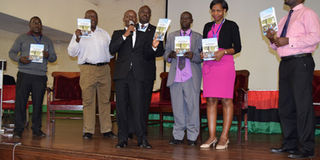Low education, corruption killing service delivery in districts - study

Findings. The information scientist and baraza coordinator in the Office of the Prime Minister, Mr Joseph Muserero (with microphone), and other officials display copies of a report on social accountability in Kampala last week. PHOTO BY JALIRA NAMYALO
What you need to know:
- Recommendation. The report recommends that citizens should be empowered to exercise their rights.
BUSHENYI/IGANGA/KUMI. A new report on local governments has cited lack of academic qualifications among district leaders, poor social accountability mechanisms and corruption as some of the hindrances to service delivery.
The report titled: “An audit of social accountability mechanisms in local governments in Uganda” also shows that there is no direct participation by individuals because some elected leaders do not represent communities’ views or consult them.
The report is based on a study conducted between 2015 and 2017 to assess the effectiveness of social accountability mechanisms in local government service delivery in Bushenyi, Iganga, Kyenjojo, Kayunga, Kumi and Mbale districts.
While releasing the findings last week, Ms Salma Namusobya, the executive director of Initiative for Social and Economic rights (ISER), a local organisation that conducted the study, said the report seeks to empower citizens to exercise their rights and raise their voices.
“Barazas (community meetings), which are organised by the Office of the Prime Minister (OPM), are a good platform for citizens to participate in decision making, but the OPM is not consistent in organising them and they are not well facilitated,” she said.
Ms Namusobya said people are not aware of the existing mechanisms through which they can participate in local government service delivery.
“Design weaknesses and operational limitations such as lack of financial, human and infrastructural capacity and insufficient knowledge and appreciation on the part of duty and right bearers makes service delivery difficult at local governments,” reads the report in part.
The report also recommends that councillors should have an O-Level Certificate while mayors an A-Level as a minimum academic requirement.
Currently, there is no qualification needed for local government positions.
Mr Martin Mapenduzi, the Gulu District chairperson, said most councillors and LC3 chairpersons are illiterate which hinders their performance.
“How do you expect an illiterate LC3 chairperson to supervise a sub-county chief and a community development officer who are all graduates? Parliament must fix this to help improve service delivery,” he said.
Prof Jaap De Vesser from the University of Pretoria, urged the central government to devise mechanisms of helping the local governments to work independently and democratically in order to effectively deliver services.


